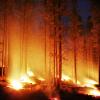
Dealing with increasing fire frequencies in domestic mountain-dominated forest systems requires assessment and anticipation of fire risks at local scales, as well as a better understanding of its effects on the ecosystem and recreational activities. The Austria Fire Futures Project aims to address this critical situation.
Global warming causes increased risks of wildfires worldwide due to rising temperatures and more severe and longer drought periods. This trend of higher fire frequencies affects even relatively humid regions such as the Alps, where higher temperatures in combination with snow-poor winters, lightning activity, and more pronounced dry periods favor an increased occurrence of wildfires. The past fire seasons in Austria have proven how widespread forest fires may occur.
“In Austria, both fire frequency and areas burned have increased in recent years. This highlights a need to establish a strong link between national statistics and wildfire research, which should form the basis of national wildfire management and emergency planning,” comments IIASA researcher Andrey Krasovskiy. Krasovskiy is in charge of the fire risk model development in the Austria Fire Futures Project, which includes the parametrization and optimization of the Wildfire Climate Impacts and Adaptation Model (FLAM) to capture key fire-related variables for Austria.
The consortium of the Austria Fire Futures project comprises the Agriculture, Forestry, and Ecosystem Services Research Group of the IIASA Biodiversity and Natural Resources Program; the Austrian Research Centre for Forests (BfW); and three institutes from the University of Natural Resources and Life Sciences in Vienna – the Institute of Silviculture; the Institute of Landscape Development, Recreation, and Conservation Planning; and the Institute of Meteorology and Climatology.
The idea for the Austria Fire Futures Project was born from earlier discussions between the consortium partners about the White Paper for Policymakers “Forest Fires in the Alps” (Mueller et al. 2020) and how to best address the major fire prevention challenge it identifies, namely the urgent need to develop dynamic fire risk maps based on high-resolution hotspots and mapping and implementing these for Austria into a broadly accessible platform. So far, fire risk maps that include fire hazards (endangered vegetation), fire triggers (human and lightning), and fire vulnerability (e.g., endangered infrastructure, settlements, and potential damage), are only available in some regions of the Alps, for instance, in Switzerland. Fire hazard modeling is central to generating such maps on a local scale, in order to identify endangered forest types in combination with topographic effects.
“We believe that innovative and improved fire risk hotspot mapping is foundational for all further forest- and wildfire prevention and hence needs to be seen as an indispensable tool for integrated fire management – prevention, suppression, and post fire measures – while substantially contributing to mitigating climate change as well as minimizing damage to ecosystems, their services, and people,” concludes Agriculture, Forestry, and Ecosystem Services Research Group Leader, Florian Kraxner, who coordinates the project at IIASA.
News

04 July 2024
ALFAwetlands: assessing mid-term project milestones

26 June 2024
Wavelet phase difference and granger causality: Evidence connecting phase difference inference to granger causality

21 May 2024

